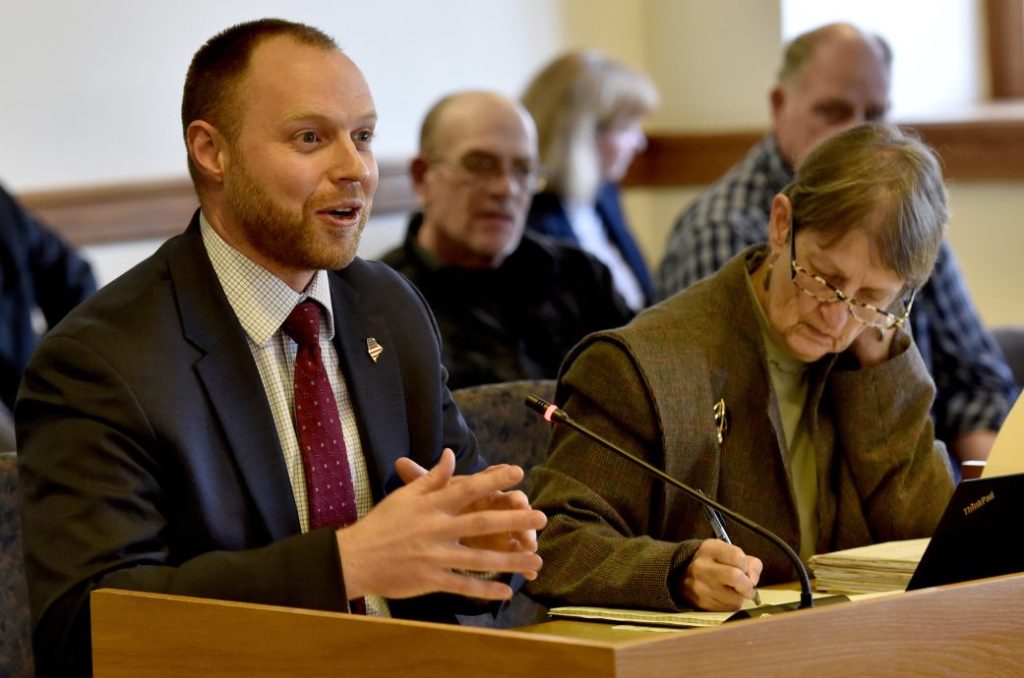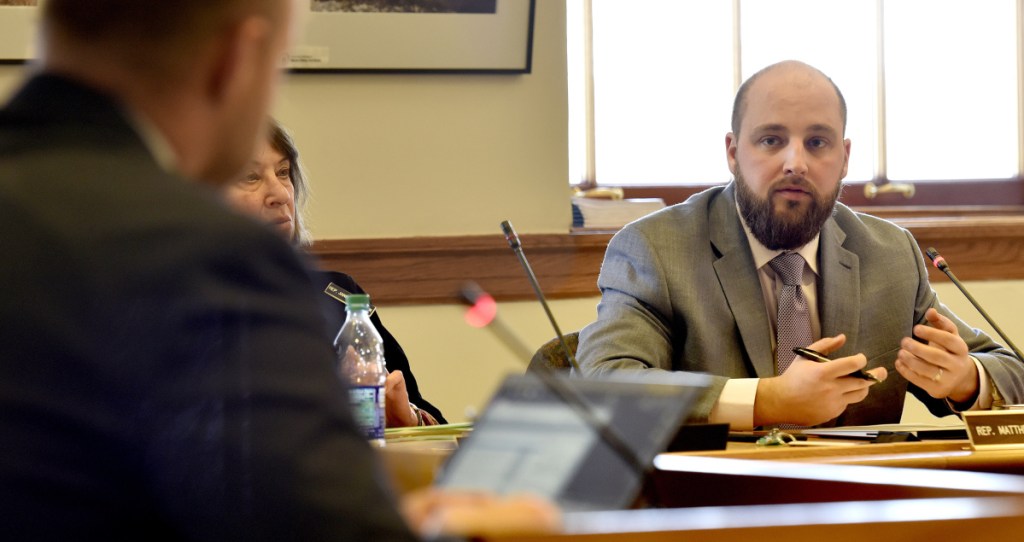AUGUSTA — A legislative committee on Tuesday issued a three-way report on a bill that originally sought to protect the elderly facing tax lien foreclosure.
The 7-3-1 “ought to pass” vote on L.D. 1629 followed a lengthy discussion by the Joint Standing Committee on Taxation on an amendment presented to the committee by Nick Adolphsen, senior policy adviser to Gov. Paul LePage.
LePage initiated the bill after the town of Albion foreclosed on an elderly couple’s home on Lovejoy Pond and sold it in a sealed auction bid for $6,500 after a neighbor that came to the couple’s aid offered $6,000. LePage said the property was worth $70,000 to $80,000 and that equity they had built into their home was lost. The new owner evicted the couple, who now live in a nursing home.
In a public hearing and through three work sessions held over the last few weeks, taxation committee members debated the language in the bill, with some saying it would place an unfair burden on municipalities that already help elderly people with tax abatements if they request them, and some saying they did not think the state should interfere in the way municipalities sell properties.
Adolphsen’s amendment, drawn up as a way to reach compromise, effectively removed all language in the bill and added two short sections that said that within 30 days of a municipality filing a tax lien, it should send the homeowner a notice advising him of the right to file an application for a tax abatement and telling him how to file it. Also, the amendment says the municipality will assist the person upon request and advise the person of the right to seek help through the state’s Bureau of Consumer Credit Protection to connect with someone who will work with the municipality on behalf of the homeowner. The amendment also says that no later than July 15 each year, that bureau is to provide a statewide organization representing municipalities with information to be included in the notice.
The committee removed language from Adolphsen’s amendment. Language that says the bill applies to people 65 and older who are receiving the homestead exemption was dropped. Language that said that after a foreclosure process is completed, the property may be listed for sale, and, if listed, must be sold by an independent licensed broker at fair market value or at a price at which the property is anticipated by that broker to sell within 90 days was dropped. Also removed was language saying the proceeds from the sale after taxes, interest and fees are paid should go to the homeowner.
An earlier version of the bill said a municipality must work with those facing foreclosure to find an alternative such as a tax abatement or payment plan and that if a foreclosure occurs and the town sells the property, the homeowner gets the proceeds of the sale beyond what is owed the town in taxes, interest and fees.
Seven committee members on Tuesday voted the bill “ought to pass” with the amendment: Committee Chairman Sen. Dana Dow, R-Waldoboro; Rep. Stephen Stanley, D-Medway; Co-chairman Rep. Ryan Tipping, D-Orono; Sen. Justin Chenette, D-Saco; Rep. Matthew Pouliot, R-Augusta; and Rep. Janice Cooper, D-Yarmouth.
Four voted against passage: Rep. Gary Hilliard, R-Belgrade; Sen. Andre Cushing III, R-Newport; Rep. Gay Grant, D-Gardiner; and Karleton Ward, R-Dedham.
Of those four, three voted to pass with a different amendment that includes language requiring municipalities to use a licensed broker to sell a property, and, after the municipality receives taxes owed and other fees, to return proceeds to the homeowner.
Grant voted ought not to pass.
The bill now goes to the revisions office and processing of the final amendment. The House will then consider the three reports of the committee and then the bill goes to the Senate.
Grant had asked Adolphsen in a prior work session to bring statistics to the committee showing how many people in Maine had gone through a situation similar to the Albion couple’s tax foreclosure and, more importantly, to report what those cases had in common. She and other committee members said LePage had mentioned about a dozen such situations in which elderly people lost their homes.
Adolphsen said Tuesday that he sought that information from the state’s property tax division and Bureau of Consumer Credit and Protection but they do not keep numbers. To get them, one would have to go to the towns individually, he said.
Tipping asked if the committee could hear about the 12 cases LePage cited, but Adolphsen said that in order to do that, he would have to get permission from those involved.
Grant, who had emphasized that municipalities work hard to help property owners, said it is difficult to make public policy on anecdotes, though she understands the reluctance to divulge the identities of people who have experienced foreclosure. She cited the need for knowing key elements to those cases, however.
“I do appreciate how difficult it is to get this, and I do appreciate your trying to address it head-on,” she said, adding that the town of Albion was “eviscerated” over the issue and no one tried to protect the elderly couple there.

Richard Sukeforth sits for a portrait Friday at his daughter’s mobile home in Holden. Sukeforth has been living there since he was evicted from his home in 2015.
That couple, Richard and Leonette Sukeforth, came forward publicly with their situation. A friend of the family who tried to help them and pay their taxes, MaryAnn Sawlan-Nieman, went to LePage’s office with Richard Sukeforth to notify him of the situation. Nieman also submitted the lower $6,000 sealed bid for the property.
Pouliot said he thought it important not to unduly burden municipalities as part of the bill.
“I do think that there is room for improving the process in terms of helping taxpayers better understand what their options are,” he said.
Kate Dufour, of the Maine Municipal Association, said municipal officials have been put on trial and accused of crimes without the benefit or option to review evidence in the case or give another side of the story. It was difficult, she said, to find an amendment to the bill that MMA agrees on. MMA officials do not understand the problem that the bill and the amendments are trying to resolve, she said.
“We’re not convinced that it’s there,” she said.
Dufour said nothing in the language of the bill will prevent a person of means from avoiding paying taxes.
“Anybody who meets the age qualification would benefit from this new proposal,” she said.
She said the bill could cause a “creep effect.” If a property taxpayer 65 or older receives a tax exemption, then the state could move to other classes — veterans and those who are disabled, for instance.
Dufour maintained there is nothing in state law that prevents municipalities from adopting a procedure that allows them to sell a property and return proceeds to the homeowner.
“Municipalities can already do that. We think those decisions are best left to local leaders.”
Amy Calder — 861-9247
Twitter: @AmyCalder17
Send questions/comments to the editors.






